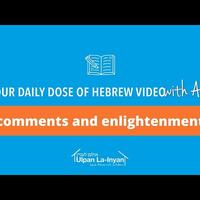Your Daily Dose of Hebrew | הערה והערה - comments and enlightenment
Your Daily Dose of Hebrew | comments and enlightenment
אהלן חברים יקרים
פעם, כל היהודים היו מבטאים
It used to be that all Jews would pronounce
את האות עי"ן כמו שהערבים מבטאים אותה
the letter Ayin the way the Arabs pronounce it
פחות או יותר
more or less
וזאת אומרת שהיו מבדילים
meaning that they would differentiate
בין המילים "להעיר" בעי"ן
between the words להעיר-to comment, with an Ayin
ו"להאיר" באל"ף
and להאיר-to enlighten, with an Alef
"להעיר" עם עי"ן זאת אומרת
להעיר with an Ayin, meaning
לתת איזו ביקורת מסוימת או הערה
to give some kind of criticism or comment
ו"להאיר" עם אל"ף מלשון אור
and להאיר with an Alef from the word אור-light
להאיר על משהו
enlighten on something
עכשיו, איך אנחנו מבדילים היום
now, how do we differentiate today
בין המילים האלה?
between these words?
דבר ראשון - קונטקסט, הקשר
First thing - context, context
לפי ההקשר אפשר להבין
by context can be understood
אם מדובר ב"הערה"
whether it is a הערה-comment
או ב"הארה"
or הארה-enlightenment
אם הנימה היא קצת ביקורתית
if the tone is a bit critical
או אם היא אופטימית ומפרגנת
or if it is optimistic and encouraging
אבל לא רק ההקשר
but not only the context
מורה לנו מה המשמעות
tells us what it means
אלא גם ההצרכה
but also the preposition coming after it
זאת אומרת, שאחרי "להעיר" יש ל-
means that after "commenting" there is a L
"אני מעיר לו על החולצה הלא-מתאימה"
"I comment to him on the inappropriate shirt"
אבל כשאני "מאיר" באל"ף, זה בלי למ"ד
but when I "illuminate" with an Alef, it's without a ל
בדרך כלל - למשל, "האור מאיר את הלילה"
usually - for example, "the light illuminates the night"
טוב, זהו חברים, להתראות
well, this is friends, goodbye

